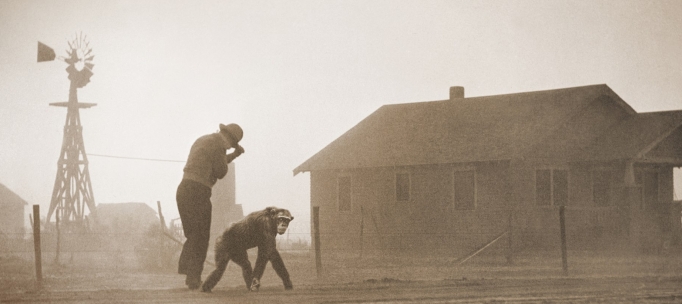
Goody at Pleasance Courtyard, as part of the Edinburgh Fringe 2017.
Lucy Roslyn’s extraordinary portrayal of a chimp in her play Goody, produced by BoonDog Theatre company at this year’s Edinburgh Fringe, follows a long line of professional ape impersonators, who performed in plays specially written to showcase their talents from the early 1800s. What has changed since that time are society’s attitudes towards both animals and performance, and the character of Goody is offered to us as an anthropological comment on connections and distance between species, rather than the simple 19th Century spectacle of contortion and acrobatic feats.
When I went along to see the play last week at Pleasance Courtyard, I was already mid-way through reading Alan Stockwell’s recent publication, Man-Monkeys: from Regency Pantomime to King Kong. The thoroughness of Stockwell’s historical research, into a niche performance area that was all but forgotten over the last century, is matched by the detail that has gone into BoonDog’s recreation of an animal trainer and his chimp companion in a Depression Era travelling circus of the US.
The reason I had picked up Stockwell’s book was my circus-based interest in the cross-over place between performing animals and humans performing as animals. In Roslyn’s play, the awareness of training processes – that are rarely put before public attention – is incredibly detailed, down to the encouraging of animals not to do something on demand, to give the illusory impression that they are responding with comic rebellion to a showman’s narrative.
When the play begins, Jesse Rutherford as Francis Bailey seems to be putting on a poor show with Goody the chimp. It later becomes apparent that this deliberately self-conscious presentation was only a rehearsal, and the stakes in achieving success are gradually revealed over the course of a tale that verges on tragedy and remains relevant to the livelihoods of many performing trainers today.
The question of whether or not animal training is abusive is a massively divisive one, with people usually planting themselves firmly on one side or another of a falsely black and white divide. It’s to Roslyn’s credit that she treats the complexities of care and cruelty with sensitivity and depth. How do you explain to your best friend that they must do what you ask them or suffer unavoidably unpleasant consequences, when the language gap between you is so wide that you only fully understand each other around 5% of the time?
Whilst the complicated relations between duty, liability and love in animal training professions are layered beneath the plot’s surface, it’s this commentary on communication – successes and failures – that is at the core of Goody.
The play’s pace under Jamie Firth’s direction is dust-bowl slow, and the yawning gaps between man and ape are stretched out, emphasising how little of Francis’ chatter reaches Goody’s brain, and how little of the chimp’s movement is imbued with meaning in the trainer’s eyes. The moments when the two do connect are beautiful, and always leave us wondering how much understanding is genuinely shared and how much we simply want to believe that both parties intuit each other’s meaning. It’s the same with our cats and dogs, and other animals nearer to home. It’s the same with our friends, our families and our lovers.
There is a lot of subtle detail in the play that makes it a delight to someone with an interest in both the circus dimension and the communicative one. A shared pidgin of repeating each other’s words and gestures; the different length of thought processes for the two primates on stage; references to the sideshow Geek – whose job is to bite off the heads of live chickens – adding a further dimension to the historical power relations between humans and animals.
The choice to give chimpanzee Goody human speech midway through the play informs us with a contemporary understanding of the species’ behaviour and psychology, and emphasises the paradoxical closeness/separation between two creatures who care for each other. In this case too, who need each other in a very fraught way. The silences of alone contrast with the conversations of together in a way that brings the realities of loneliness poignantly close.
Rutherford is a decent actor, but it’s hard to even notice this in the face of Roslyn’s exceptional ape impersonation. Her fleeting facial expressions twitch through a range of grimaces and gurns that mark her as totally non-human. The nonchalance and suddenness of vocalisations whose meaning we simply can’t grasp add to Roslyn’s postural accuracy and validate the multiple Monkey World visits she made while preparing for the show.
Most recent iterations of humans performing simian roles have been in the realm of motion capture, and it’s good to see the skilled specialism returning to the stage for such an evolved piece of theatre. And, with next year’s #Circus250 celebrations marking the anniversary of the world’s first circus in 1768, Goody would be a topical play to broaden the dialogue about human-animal relations in professional contexts.
Goody is on at Pleasance Courtyard until 28th August. Click here for more details.

